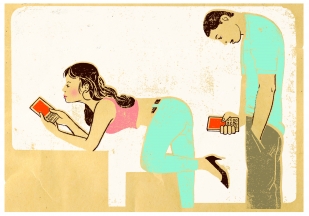Sexless and the City: Web Warps Libidos of Coked-Up Careerists
On a recent Friday night, a 22-year-old in his first year of living in New York hosted a late get-together in his Little Italy apartment. Everyone there would call it a good party, but it decidedly lacked a climax.
Until 10 in the morning, a dozen attractive men and women—day laborers in film, public relations, media, fashion—drank Peroni, smoked cigarettes and indulged in cocaine as someone with an iPhone 4 blasted songs through the speakers. A girl sitting next to a Harvard M.B.A. student looked through a coffee table book of Todd Selby’s photography. There was a conversation going on about Twitter—most of those present kept a vigorously updated account.
Then came the sun—the traditional cue that one should choose a member of the opposite sex and set off for his or her apartment, to sleep together. Instead attendees departed alone. They peeled off instead of pairing up. No one at the party got laid that night and, even worse, no one gave a fuck.
YOUNG NEW YORKERS no longer care about having sex. It’s not the endgame, nor even the animating force of social interaction. Men and women still get dressed up, but not for the purpose of taking off their clothes in another’s company. What used to signify desire or the desire to be desired now boils down to narcissism. How will I look on Patrick McMullan tomorrow? Or just on Facebook? The Observer spent a few weeks at parties and gatherings fraught with abstinence but slack of any sexual tension, and we heard a repeated sentiment, often delivered with uncharacteristic fervor: “We are a self-obsessed generation.”
What devalued sex for 20-somethings in New York City? Social media networks, rather than bringing people together, encourage nothing so much as an orgy of self-congratulation. Anyone worried about accumulating Twitter followers could be racking up bedmates. The networks are omnipresent. Dueling iPhones rest on the nightstand. And if you sleep with someone, they’ll be all over five Firefox tabs for the next week.
“He was in my Twitter feed, on my Tumblr dash, in my Gchat group, writing the articles I read,” a young woman who works at an Internet start-up told The Observer, over Gmail chat. “It’s like you don’t want to become attached with someone else’s online identity—or known because of someone else’s online identity, who you’re dating. You want your own, damn it.”
There are aggravating factors. Cocaine is again going around, and everyone would rather stay up doing it than going to bed. Cab rides from downtown back to Bushwick with a potential paramour ruin the mood and are best avoided. But the most prominent cause for the shift is the way the codes of online interaction has been transferred to the mores of New York socializing.
The platonic cliques spend all day tweeting at each other, forming exclusive @-reply feeds that appear only to them, and at night flock to the same bars, clubs and after-parties. It’s harder to go home with someone knowing that you’ll be seeing their avatar the next morning and every morning after that.
“New York is too dense; you’re running into people all the time, everyone knows everyone,” said a male consultant in his mid-20s. “Sex just doesn’t make sense—it’s dirty.”
It was around 2 a.m., and The Observer was sitting with the consultant at a booth, presumably taken from a diner, that has abetted the consumption of thousands of cigarettes. It now rests by the panoramic windows in his Delancey Street apartment, which doubles as his office. Noise is insulated from neighbors, and there is ample crowd space. On the wall hangs a glass marlin named Marlin Brando. It’s a swell place to stay up all night drinking, doing drugs and not finding other people to sleep with.
For a while, the apartment has welcomed last-call castoffs who arrive around 4 or 5 a.m.—a mix of nightlife promoters, musicians, aspiring actresses, friends connected through college, television personalities, Google employees, gossip reporters, skate kids and writers for The New York Times. And, in the past, certain attendees would see former sexual partners.
“It’s gross to be, like, at a party and there’s five people you’ve had sex with, but you don’t really even have a relationship with them to the point that you’d even say hi,” the consultant said. “I’ve noticed that happen at parties here. It’s just … awkward.”
But such encounters have become less likely, he added.
“It’s come to a point where people don’t necessarily want to do that anymore.”
No, they don’t. Sex is antithetical to the way they socialize, disruptive to the larger plan, a gateway to chaos in a digitally ordered world.
- Tags:
- Culture |
- The Daily Transom |
- Abstenence |
- cocaine |
- Gchat |
- iPhones |
- Nate Freeman |
- Sex |
- Sexless and the City |
- skins |
- The Youngs |
- Tumblr |
















